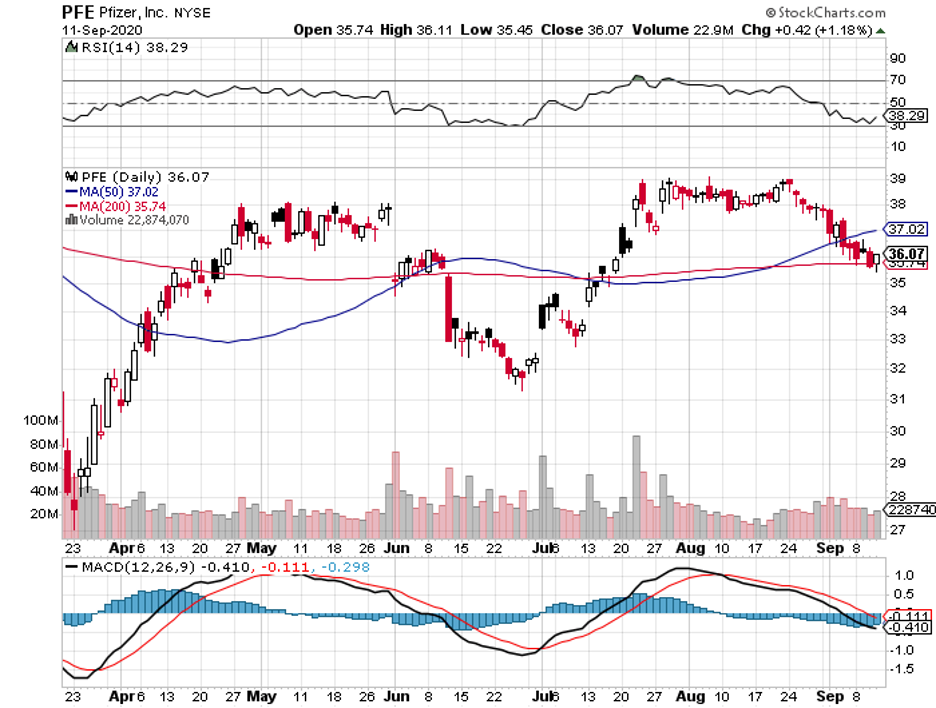Should We Crown Pfizer as COVID-19 Vaccine King Now?
Pfizer (PFE) has never been coy about playing up the potential of its COVID-19 vaccine candidate, BNT162b2, which it co-developed with German biotechnology company BioNTech (BNTX).
Now, it looks like the New York-based biopharmaceutical giant is putting its money where its mouth is.
Pfizer recently announced that it would be able to send BNT162b2 for FDA review as early as October.
More impressively, the company claims that if its COVID-19 vaccine gets approved, then it can start distribution in the US by the end of 2020.
In fact, Pfizer has already started manufacturing hundreds of thousands of doses of the vaccine.
Only a handful, if any, of the companies working on a COVID-19 vaccine are as confident as Pfizer. So far, only Moderna (MRNA) and AstraZeneca (AZN) can claim to be close rivals of the company.
Boosting the claims of Pfizer that it can produce results by October is the company’s decision to expand its Phase 3 vaccine trial. From the originally approved 30,000 participants, Pfizer seeks to add more to reach 44,000.
The expanded patient pool will include participants as young as 16 years old. Those with HIV and Hepatitis B and C will also be added to the list. Pfizer will also recruit more African Americans and Latinos. To date, the list includes 60% white and 40% people of color. Meanwhile, older participants comprise 44% of the group.
Like its fellow vaccine developers, Pfizer has also secured deals with different countries.
In July, the company secured a $1.95 billion contract with the US government. This deal will cover 100 million doses of BNT162b2, which is priced at $19.50 per dose. The contract also offers the government the option to add 500 million doses to its initial order.
BNT162b2 requires two doses, the initial shot and the booster shot. This puts the actual price for the two-dose regimen at $39.
In the same month, Pfizer also reached an agreement with the UK government to supply 30 million vaccine doses. Even Japan’s Ministry of Health reached out to the company and forged an agreement for 120 million doses.
Pfizer and BioNTech estimate that it will need to produce 100 million doses by the end of 2020 and 1.3 billion doses to cover the demand worldwide.
Pfizer expects the sales for BNT162b2 to peak this year and throughout 2021. It might even reach the early months of 2020.
After this period, the vaccine will still be able to provide a steady revenue stream thanks to regular and repeat vaccinations over the next years.
So far, Pfizer accounts for roughly 13% share of the vaccine market across the globe. This competitive advantage would make it quite convenient for the company to leverage this status to capture a minimum of 6% of the COVID-19 vaccine market.
A conservative estimate for this market size would put Pfizer’s annual earnings after the peak sales period of the vaccine at roughly $1.52 billion.
However, Pfizer’s dominance in the COVID-19 vaccine race is not confined to its widely publicized work on BNT162b2.
Unlike its competitors that fielded only one candidate each, Pfizer and BioNTech included four potential messenger RNA-based vaccines in their studies. Ultimately, they chose to move forward with BNT162b2.
While everyone is focused on how the candidate will fare in the trials, Pfizer and BioNTech quietly initiated a Phase 1 clinical study for their fifth and virtually unknown candidate: BNT162b3.
This move by Pfizer and BioNTech echoes the strategy its leaders shared in the beginning.
By having “multiple shots-on-goal,” the companies are in a great position for the “long-term catch-up vaccination, revaccination, and/or pandemic stockpiling markets."
After all, the first wave of COVID-19 vaccines that reach the market will not be the endgame.
Similar to most contagious diseases, follow-up vaccines with higher efficacy and proven to be safer than those released earlier would have the chance to attract a substantial market share.
With the fifth vaccine candidate, it is clear that Pfizer and BioNTech do not simply want to be the first to launch a COVID-19 vaccine. Both companies aim to become the most dominant players in the coronavirus vaccine market over the long run.
Overall, Pfizer has once again chosen a diversified approach in dealing with the tight competition in the COVID-19 race.
This strategic decision could be one of the most compelling reasons to bet on this big biotechnology and healthcare stock today.


